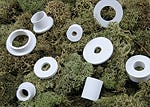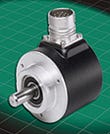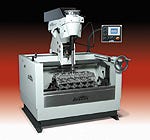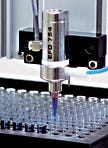Products from the MPMN Mailbox 15221
December 1, 2005
Originally Published MPMN January 2006 PRODUCTS
Rapid Soft Tooling A manufacturer of plastic parts has introduced rapid soft tooling (RST). Micro Plastics Inc. (Flippin, AR; www.microplastics.com) offers the process for making washers, shoulder washers, and spaces. RST is suitable for fast-paced design engineering and low-volume production runs. According to the company, RST can be used to produce parts in one week. Part specification requirements include a maximum OD of 1 1/16 in., and maximum ID of 7/8 in. A minimum wall thickness of 1/32 in. for small parts and 3/64 in. for larger parts can be achieved. Temporary Masking Resins
Temporary masks offer surface protection for orthopedic implants, implant hardware, surgical instruments, and medical devices. The Speedmask 7100 series of temporary metal masking resins from Dymax Corp. (Torrington, CT; www.speedmask.com) cure in seconds using UV light. Multiple viscosity ranges simplify dispensing and reduce mask application to a single-coat process. The resins leave no toxic residue on surfaces and resist acid and alkali cleaning and plating solutions. A range of adhesion levels are available for sealing and protecting surfaces during tumbling, peening, abrading, and cleaning processes. Blasting and peening masks eliminate external damage to coated and noncoated surfaces. The masks are available in both peelable and water-soluble grades. Peelable masks peel away from surfaces at room temperature or after a warm water soak at 120° F. Water-soluble masks wash off with hot water spray or in agitated baths ranging in temperature from 140° to180° F. Rotary Encoders
Incremental rotary encoders can be used in harsh application environments. The RVI58 series encoders from Pepperl + Fuchs (Twinsburg, OH; www.am.pepperl-fuchs.com) have incremental measurement outputs up to 10000 ppr and an IP65-rated 58-mm diam aluminum housing. The encoders come standard with a shielded cable or round connector, and feature quadrature and index outputs or quadrature and index plus complementary outputs. Additional features include a servo or clamping flange, 6- or 10-mm diam shaft, alarm output, and 10–30 V dc or 5 V dc power capability. Honing Machine
A vertical honing machine can be used for precision honing of 0.75 to 8 in. bores. The SV-10 vertical machine from Sunnen Products Co. (St. Louis, MO; www.sunnen.com) has two motors, one for the spindle and one for the stroker. The DH-series diamond hone has 16 points of cutting action. The mechanical stroke guarantees precision surface finish with consistent crosshatch angle in each cylinder. The machine also features a patented full bore profile display, which projects a real-time graphic of the bore cross-section. A zoom feature maximizes the bore view. During the cycle, the machine allows the operator to dwell the honing tool anywhere throughout the bore. The dwell pointer can be moved to the position where the bore is visually smaller and the tool will dwell there as long as necessary. Variable spindle rpm and stroke speed allows an infinitely variable crosshatch angle for any bore-diameter and cylinder-length combination. Aseptic Dispense Valve
A precision dispense valve has an aseptic design that reduces the risk of contamination in sterile fluid–filling processes. The 754V-SS from EFD Inc. (East Providence, RI; www.efd-inc.com) uses a low-maintenance diaphragm design to provide fast, precise dispensing of most low- to medium-viscosity fluids. It can be cycled up to 500 times per minute, with shot size ranging from 0.5 μl to a continuous flow rate of 60 μl/sec. A fast, clean cutoff after each shot prevents drips and waste. To ensure sterility and simplify cleaning, the valve’s fluid path is smooth and free of areas where contaminants or bacteria could collect. Wetted parts are made of FDA-compliant 316L stainless steel and PTFE suitable for clean-in-place or sterilize-in-place processes. Instead of seals or O-rings, the valve uses an inert PTFE diaphragm, conservatively rated at 10 8 cycles, to isolate the fluid from the valve’s internal parts. The amount of fluid dispensed is determined by a combination of fluid pressure, flow rate, and valve open time, with open time regulated with a microprocessor-based ValveMate controller. Mounted near the valve, the controller simplifies system setup and allows open time to be adjusted in increments as small as 0.001 sec, for consistent and precise shots.
|
You May Also Like





.png?width=300&auto=webp&quality=80&disable=upscale)

